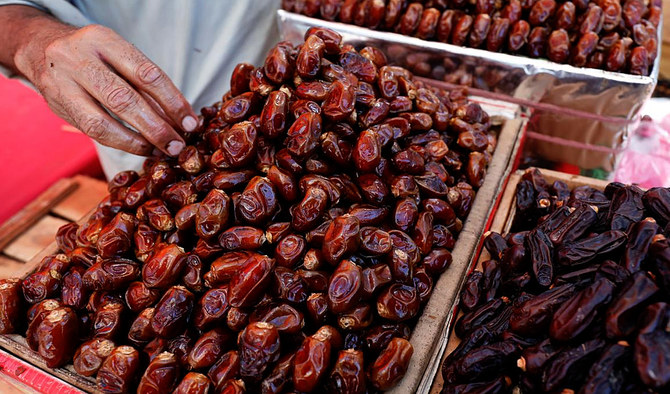KARACHI: Despite declining sales of dates during this year’s Ramadan, their expensive varieties cultivated in Saudi Arabia remain in high demand among Pakistani consumers.
“Although our sales have declined due to the lockdown situation that imposed restrictions on our movement, high quality dates, especially from Saudi Arabia, are still in great demand,” Hajji Abu Baker, who owns Bombay Dry Fruits, told Arab News on Tuesday.
Abu Baker travels to the Kingdom every year to handpick the best available dates from Saudi farms. However, he missed the trip this year due to the coronavirus pandemic that led to a suspension of international flights.
“I bought dates during the last season and brought one part of my consignment to Pakistan as well. However, I left a large portion of my purchase in the Kingdom since they have better storage facilities in Saudi Arabia. Now we are selling the available stock, though it should be enough to meet the demand under the circumstances,” he said.
Abu Baker is among the best known importers of Saudi dates in Pakistan and sells the product after significant value addition. His team mixes honey with the product or adds pistachios and almonds to its different varieties. The mouthwatering stock is then sold to a loyal customer base.
The demand for dates significantly increases in the Muslim fasting month of Ramadan since it is customary to break one’s fast with them during the sunset meal. The prices of Saudi dates are also very high, and they are mostly purchased by the affluent class. However, sellers of the product have not increased their rates this year.
“Last year the prices of different varieties were between Rs 1,400 to Rs 3,600 per kilogram. This year, however, there is no change in them. Ajwa, which is the most sought after variety, is available for Rs 2,600 per kilogram,” he added.
Ajwa, Anbara Safawi, Sukkari, Barhi, Saghai, Kalmi, Khudri, Kholas and Medjool are the most famous Saudi dates available in Pakistan.
Due to their high price, these dates are not sold in Karachi’s wholesale KHajjoor Market where the average price remains around Rs 400 per kilogram.
“The rates of Saudi dates are very high. That’s why they are not sold here,” Hanif Baloch, General Secretary of the KHajjoor Market Association, told Arab News.
With an annual yield of about 1.1 million tons, Saudi Arabia is the top producer and exporter of dates in the world. While Pakistan is also among the top 10 producers of dates with around 557,000 tons of production, it meets half of its demand by importing the product.
Pakistan is also in the process of developing some Saudi varieties through tissue culture at different research centers in Sindh.
“We are developing different varieties Saudi dates, including Ajwa. We hope to introduce its samplings in different parts of the country where there is suitable climate for them,” Dr. Ameer Ahmed Mirbahar, who works as the director of Date Palm Research Institute at Shah Abdul Latif University in Khairpur, told Arab News on phone.
Mirbahar, who is also working on a research papers that is likely to be presented in the International Date Palm Conference 2020 in Saudi Arabia next November, stresses the need for value addition in dates that he hopes to produce in Pakistan.
The conference is organized by the King Faisal University (KFU) and will bring together industrial stakeholders, entrepreneurs, farmers and consumers.
“Organizing such international conference to share the applied, innovative and multidisciplinary scientific knowledge among scientists and other relating stakeholders is a splendid opportunity and commitment to making genuine and reliable contributions to the date palm sector,” Dr. Mohammad Abdulaziz Al-Ohali, president of the university, said in a statement posted on its website.
“The participants will submit the abstract of the research by May 20, 2020,” Mirbahar, who is optimistic that the event will be held as per schedule despite the pandemic, said.
















